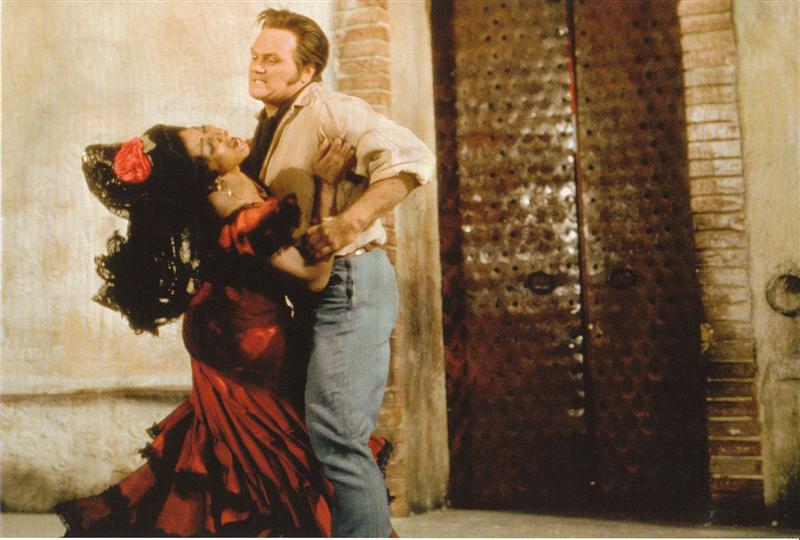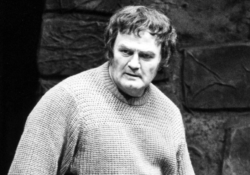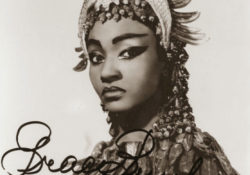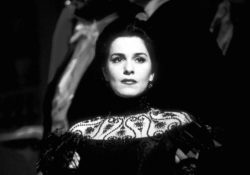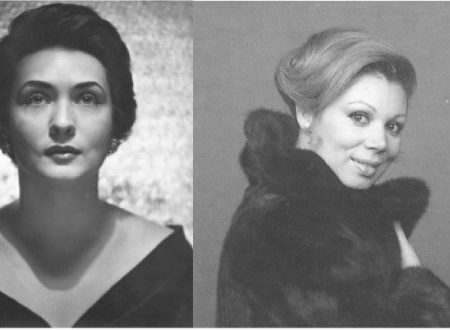Part of the Singers on Singing: Signature Roles series
GRACE BUMBRY DISCUSSES THE TITLE ROLE IN BIZET’S CARMEN
In the first of our two 80th birthday conversations with Grace Bumbry, the great dramatic soprano and mezzo-soprano discussed Amneris in Verdi’s Aida, one of her most famous signature roles. In this second conversation that we are publishing here now, she reflects on one of her other most famous signature roles, the title part in Bizet’s Carmen. From the time that she first performed the role, early in her career in Paris in 1961, she challenged a widespread prevalent view of Carmen by emphasising the character’s depth and complexity while yet very much portraying her enticing allure. As she always has done with all the roles in her exceptionally wide ranging repertoire, she took the music as her cue for the personality, recognising that Bizet conjured up not just a feisty and provocative woman but also a lady of calibre – and distinction.
-Jon Tolansky
I see Carmen as someone special – a special gypsy, an unusual gypsy, which is why everyone gravitated towards her. She doesn’t have to do anything – other than exude her femininity, or rather her femaleness. You don’t shake the hips and all that kind of exhibitionism – you stand there and you are noticed because you are different from all the other gypsies. All of that is written by Bizet in his music. You don’t need to do anything with the Seguidilla and exaggerate it or flaunt yourself – all the power of Carmen is there in the sultriness that Bizet has created in the music of the Seguidilla. It’s very insouciant, so if you just sing as it’s written you have the real personality of Carmen right there for you. But if you start to exaggerate, you lose the power and the appeal of her character – the quality that overcomes Don José.
LISTEN TO THE AUDIO CLIP BELOW
Example 1 from “Grace Bumbry discusses Carmen”
Excerpt from Georges Bizet’s Carmen
Carmen: Grace Bumbry
Orchestre du Théâtre National de l’Opéra de Paris
Conductor: Rafael Frühbeck de Burgos
Indeed, Grace Bumbry ideally captured that quality – its elusive complexity that makes an inexperienced, conservative and traditionally religious young man from a simple country background become obsessed with her. It is a quality that Don José has no understanding of whatsoever – which Carmen realises will be her demise.
Carmen understands Don José, but he doesn’t understand her at all, and he can’t accept her the way she is because of that. Don José is, for me, someone who is in a different world – because of his religiosity. Carmen as a gypsy has her own kind of religion, which is freedom and also destiny – those are the gypsies’ kinds of religion, their beliefs. The big difference is that although he doesn’t understand her, she understands him, and she faces up to her inevitable demise because of that.
Grace Bumbry certainly sees how easily the depth of Carmen’s personality and the psychological power of her defiant challenge to a conventional, religiously based society can be undermined by productions that show her most of all as basically a ‘vamp’.
So many directors want to make a caricature of her. They so often either do what they think the public wants to see, or the exact opposite – and what they should be doing is showing her as she is in the story. And for me, that is a woman who is classy as well as being fun and sexy. I remember a review very early in my career when I had sung Carmen in Japan, on tour with the Paris Opera (
LISTEN TO THE AUDIO CLIP BELOW
Example 2 from “Grace Bumbry discusses Carmen”
Excerpt from Georges Bizet’s Carmen
Carmen: Grace Bumbry
Orchestre du Théâtre National de l’Opéra de Paris
Conductor: Rafael Frühbeck de Burgos
That powerful complexity is vividly expressed in the famous film of Carmen that Grace Bumbry made with Herbert von Karajan as director as well as conductor. Karajan selected Grace precisely because of the subtlety as well as the allure in her interpretation and also because of her especially outstanding vocal mastery, a quality he always searched far and wide to find in a singer. Notwithstanding this, Grace has reservations about Karajan’s own interpretation of the opera.
I realise that Karajan was looking for the kind of subtlety that you were talking about, but I didn’t agree with how he saw Carmen’s personality overall. He wanted her to be more like Bizet portrayed her and I wanted her to be more how Mérimée portrayed her. Now of course I know that I was singing Bizet’s opera, but we also know that in some ways Bizet was forced to soften Carmen’s character against his wishes because of the insistence of the Paris Opéra Comique (
LISTEN TO THE AUDIO CLIP BELOW
Example 3 from “Grace Bumbry discusses Carmen”
Excerpt from Georges Bizet’s Carmen
Carmen: Grace Bumbry
Orchestre du Théâtre National de l’Opéra de Paris
Conductor: Rafael Frühbeck de Burgos
The tenor singing Don José in the film with Karajan was the same singer who took the role in the audio recording of Carmen that Warner Classics has generously agreed we can use to illustrate Grace Bumbry’s comments on the opera: Jon Vickers (with Mirella Freni and Kostas Paskalis and l’Orchestre National de L’Opéra de Paris conducted by Rafael Frühbeck De Burgos). In the stage partnership Grace Bumbry had with Jon Vickers in Carmen, she felt she was with an artist who was on the same wavelength as herself.
I am sure Jon Vickers was the best partner I ever had as Don José. This was because he brought something to José other than just a good looking man or a nice guy whom I was supposed to conquer. He brought a depth of character to that role – of real character. Don’t forget, José actually betrays himself to his mother and to Micaela, and his confusion and guilt about that and the way he ultimately blames it on Carmen was a very strong dimension of his performance. And I found the last Act with him awe-inspiring. His timing was so spontaneous and so unpredictable that it was absolutely life-like. You really did fear for your life on stage in that last Act with Jon. There was an amazing rapport between us that was unique for me in that opera. Interestingly, when we first sang together, in Samson et Dalila in Chicago in 1965, we didn’t get on at all. We were two strong willed people with different views. But by the time we came to do Carmen, each of us had come to grips with the other’s personality, and yet with that little bit of edge that was still there, and that came out very tellingly in the last Act. There was a weight in that Fourth Act that you couldn’t put your finger on but you knew there was real danger there.
LISTEN TO THE AUDIO CLIP BELOW
Example 4 from “Grace Bumbry discusses Carmen”
Excerpt from Georges Bizet’s Carmen
Carmen: Grace Bumbry
Don José: Jon Vickers
Orchestre du Théâtre National de l’Opéra de Paris
Conductor: Rafael Frühbeck de Burgos
I also felt that in the mountain scene in Act Three. Jon was genuinely dangerous when he attacked Escamillo, and that made me feel a kind of pity for Escamillo that I never had for José.
The life-like electricity between a great Carmen and a great Don José was not the only mutual attribute of Grace Bumbry’s and Jon Vickers’ performances in this opera. They both shared a fanatical musical perfectionism as well as a passionate dramatic zeal, as was so palpably captured in the recording (Warner Classics 3676962) from which we have selected the extracts in this feature.
-Jon Tolansky
Carmen (1969)
Carmen: Grace Bumbry
Don José: Jon Vickers
Orchestre du Théâtre National de l'Opéra de Paris
Conductor: Rafael Frühbeck de Burgos
Warner Classics: 3676962

